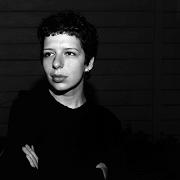|
Стихотворения.
СПб.: Пушкинский
фонд, 2000.
ISBN 5-89803-049-2,
72 с.
(Книжная серия
"Автограф",
[вып.38].)
Текст заново выправлен автором.
АВТОБУС НОМЕР
51М
Я ехала в автобусе, в котором
Все были сумасшедшими. И это
Не броская гипербола, позором
Могущая быть в творчестве поэта,
Столь пристального к мистике реалий,
Как я. Так вот, они и вправду были
Больными – осторожно забирались
На жердочки сидений и взирали
Куда-то в пустоту и говорили
Одновременно, каждый о своём,
Кому-то, кто не сущ, не осязаем,
И пахли все нестиранным бельём.
Один из них, с косицей и в
перстнях
Всё приставал к водителю с
беседой.
Изрядно светский, но беззубый рот
Его преображал поток весёлый
Нездешних и загадочных острот
В причмокивание, шамканье, однако
Оратор сам того не замечал...
Его сосед по знаку Зодиака
Сидел в углу и башмаком качал,
Как вдруг он приосанился и грозно,
Взглянув в окно, кому-то за окном
Сказал: "Всё это слишком просто,
Чтоб размышлять об этом. Я о том
Кумекаю, сограждане, что тщетно
Додумываем мысли до конца –
Нам ясно всё заранее. Ответа
Не получить глухому от слепца.
Но дело не в отсутствии контакта,
А в том, что, как с цветущего холма,
Всё обозримо, всё уже понятно.
Во всём уже – присутствие конца..."
Я с напряженьем вслушивалась в
бредни
Печального мыслителя, как вдруг
Старик, дремавший на скамье соседней,
Изобретательным движеньем рук
Ширинку распахнул и, прыгнув к двери,
Мочиться начал в черноту за ней.
Мы проезжали сквер. Кричали в сквере.
Попутчики сидели в тишине.
Другой сосед, когда-то чернокожий,
Теперь в коросте от ушей до пят,
Скрипел своею воспалённой рожей
И, так как тоже был придурковат,
Лупил по ней корявыми культями,
Унять пытаясь нараставший зуд.
(Так побеждённый лупит по татами,
Мешая струйку крови и слезу
С соплёй под потерявшим форму носом –
Но это отвлеченье...)
Пятый из
Придурков донимал меня вопросом,
Который час. – "Двенадцать без семи." –
"Двенадцать без пяти." – "Уже двенадцать."
Был предсказуем этот диалог.
Дурак пытался на ноги подняться,
Но был под кайфом и уйти не мог.
Так это было. Больше ничего
Не выжмешь из рассказа моего.
Ни пакостной метафоры, навроде
"Весь мир – дурдом", ни прения о том,
Что все мы подчиняемся природе
В итоге, как щенки под животом
Отнюдь не римской суки... Нет, не это
Вело моё дешёвое стило,
А вечное намеренье эстета –
Шнур выдернуть и выдавить стекло.
|
The 51M
I was
riding on a bus in which
everyone was crazy.
Lunatics, wholly, every one. I’m not
indulging in facile hyperbole, shameful
to discover in the language of a poet
so
thoroughly dedicated to the mining of ontology
as I. But all of them were, quite frankly,
not firing on all cylinders.
Prudently lighting upon their perches,
their eyes turned toward nothingness.
They talked as one, each separately
to someone conjured, ghosted
and they reeked of neglect.
One guy, a
ponytail and rings on every finger
was bending the driver’s ear.
A genteel yet toothless mouth
transmuted a buoyant stream
of curious, opaque witticisms
into a juicy jumble. The orator,
mind you, had no idea.
Aligned on
the corner cusp
sat his neighbour, swinging a shoe.
He directed his gaze out the window,
struck a stately pose, and proclaimed
to someone out there: “It’s all too simple
to merit deep reflection. Fellow Americans,
you catch my drift? There’s no point
thinking things all the way through.
It’s clear as day. The blind
have no words of wisdom for the deaf.
They don’t lack insight. Everything’s
as plain as the nose on your face.
It’s all known, understood,
and contains the seeds of the end.”
I sat
spellbound by the ravings
of the sad philosopher, when an old man,
dozing on the next seat over,
flung open his fly with a handy flourish,
bounded for the door and started to piss
into the night.
We rode on past a park where people stood shouting.
The passengers sat silently.
The next
guy over, once black,
was now a moist bouquet of scabs.
Squeaks escaped his swollen face,
and like an idiot, he
scraped it with clumsy stumps,
trying to soothe a febrile itch.
(Thus the resigned wrestler taps out,
blood and tears streaming
into snot from a mangled nose.
But I digress.)
A fifth nut
plagued me with his unrelenting query:
“What’s the time?” “Seven to twelve.”
“Five to twelve.” “Twelve o’clock.”
A banal transaction.
The fool tried to get off the bus,
but was too loaded to find his feet.
That’s how
it went down. You won’t squeeze
Anything more from my tale,
No sorry cliché, like,
“The whole world’s a nuthouse.”
No learned words on man’s subordination to nature.
In the end, like pups at the teat
Of a none-too-Roman bitch. No, my two-bit scripto
Was guided by something else entirely:
The aesthete’s inherent desire
To pull the emergency cord and break out the glass.
.
Translated
by Vladimir Bolotnikov Eric Crawford
|
|
